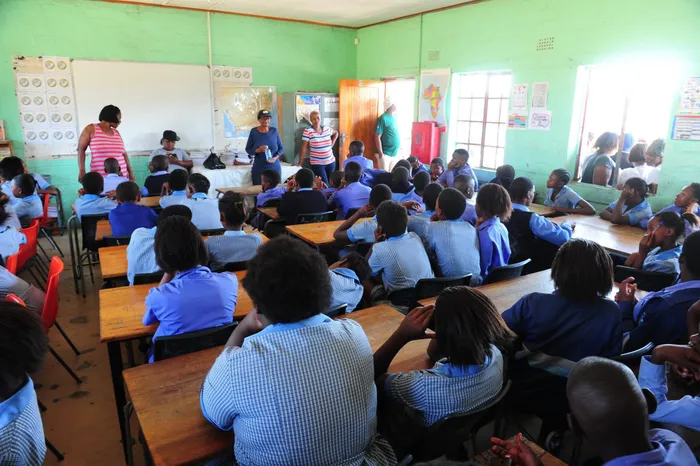Resolving schools’ overcrowding require innovative solutions

Picture: Henk Kruger / Africa News Agency (ANA) - The challenge of over-crowding in public schools is worse than we can imagine because of the distinct categories of schools, writes the author.
By Hendrick Makaneta
Basic education continues to experience challenges South Africa has approximately 15million pupils and 80% of them are found in public schools. With more than 25000 schools, one can be forgiven for assuming that over-crowding would be a thing of the past, especially if you divide the number of pupils by the number of schools.
In reality, the challenge of over-crowding in public schools is worse than we can imagine because of the distinct categories of schools.
Many pupils attend no-fee schools and that is where overcrowding is experienced. In some cases, the teacher-pupil ratio is one to 70 and that is a cause for great concern.
A huge budget has been allocated to the Department of Basic Education by the National Treasury.
So, why is overcrowding continuing to persist when the department gets a bigger chunk of the country’s coffers?
Could it be that huge as it is, the allocated budget is not enough to build more infrastructure that can alleviate the problem of overcrowding?
I wish to argue that there is a need to restructure the allocation of funds by the department.
Whereas essential items such as school nutrition should be maintained, the government should find a way to prioritise the building of more schools by reducing their allocation to private schools.
Independent schools can survive without government subsidy.
Allocations are also made to public fee-paying schools. Such allocations should also be revised to ensure that more money is channelled toward appointing more teachers in township and rural schools.
It is encouraging that R31.8 billion was allocated for 2023/24 medium-term expenditure framework, but it is discouraging that less than 7% of this amount has been allocated for the Accelerated School Infrastructure Development Initiative.
The sad part is that the allocated amount, which is R2.1bn, must be used not only for building more schools but also for eradicating pit latrines. Therefore, it will take time for the government to eradicate all pit latrines given the low amount that is allocated. The government should spend a minimum of R5bn on school infrastructure as a whole.
Failure to address the question of overcrowding will exacerbate the problem of drop-out rates which, in the main, affects pupils from poor households.
Of course, it will take a while before the challenges can be eradicated given the growing population in South Africa.
But while we are working on finding long-term solutions to the problem, the government should encourage willing private schools to explore the possibility of participating in transfer programmes.
Such transfer programmes should be aimed at using the existing spaces in private schools to accommodate some of the pupils from overcrowded schools.
While it is encouraging that the government plans to increase spending on education, we cannot rule out the impact of inflation and other economic factors at play. The government alone may not be able to fully resolve all the issues that we face. It is for this reason that the private sector should also come on board to assist in the provision of infrastructure.
The challenge of overcrowding in schools is also linked to the availability of teachers. There is no doubt that many teachers will retire in the next eight years. Universities have indicated that they are ready to close the gap that will be created by those teachers who will exit the system in their numbers.
While it is true that universities continue to produce hundreds of graduates annually, it is the quality of the cohort of graduates that remains under scrutiny. It is necessary to balance the teacher-pupil ratio correctly to ensure that quality teaching is not hampered.
The other emerging challenge is the introduction of new subjects that require an innovative approach to teaching.
As we continue to battle the issues, we should not forget that the Fourth Industrial Revolution presents its challenges that may require that we alter the old way of doing things in the terrain of education. We are duty-bound to prepare the ground for future generations, especially because of the real threat posed by the inevitable loss of some jobs soon.
The government, as the custodian of hundreds of thousands of our pupils countrywide, should take the lead by modernising the entire system of education for the general well-being of our pupils who happen to be our future leaders.
We cannot afford to set our pupils up for failure. Plans have been made, what is left is the preparation and implementation of all the plans.
*Makaneta is an education activist completing an LLB degree at the University of Pretoria.
Related Topics: